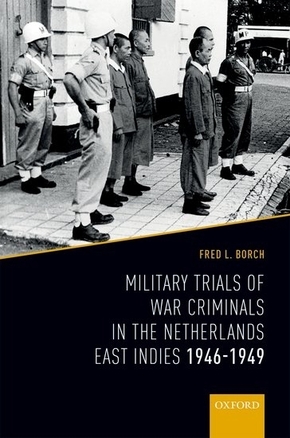Military Trials of War Criminals in the Netherlands East Indies 1946-1949
| Verlag | Oxford University Press |
| Auflage | 2017 |
| Seiten | 268 |
| Format | 16,5 x 23,8 x 2,0 cm |
| Print PDF | |
| Gewicht | 610 g |
| Artikeltyp | Englisches Buch |
| ISBN-10 | 0198777167 |
| EAN | 9780198777168 |
| Bestell-Nr | 19877716EA |
This book provides the first English language examination and analysis of the records of the Dutch war crimes tribunals from 1946-1949, which prosecuted more than 1000 Japanese soldiers and civilians for war crimes committed during the occupation of the Netherlands East Indies during World War II.
From 1946 to 1949, the Dutch prosecuted more than 1000 Japanese soldiers and civilians for war crimes committed during the occupation of the Netherlands East Indies during World War II. They also prosecuted a small number of Dutch citizens for collaborating with their Japanese occupiers. The war crimes committed by the Japanese against military personnel and civilians in the East Indies were horrific, and included mass murder, murder, torture, mistreatment of prisoners of war, and enforced prostitution. Beginning in 1946, the Dutch convened military tribunals in various locations in the East Indies to hear the evidence of these atrocities and imposed sentences ranging from months and years to death; some 25 percent of those convicted were executed for their crimes. The difficulty arising out of gathering evidence and conducting the trials was exacerbated by the on-going guerrilla war between Dutch authorities and Indonesian revolutionaries and in fact the trials ended abruptly in 1949 when 300 years of Dutch colonial rule ended and Indonesia gained its independence.
Until the author began examining and analysing the records of trial from these cases, no English language scholar had published a comprehensive study of these war crimes trials. While the author looks at the war crimes prosecutions of the Japanese in detail this book also breaks new ground in exploring the prosecutions of Dutch citizens alleged to have collaborated with their Japanese occupiers. Anyone with a general interest in World War II and the war in the Pacific, or a specific interest in war crimes and international law, will be interested in this book.
Inhaltsverzeichnis:
I: Setting the Stage
II: "Asia for Asians," Bushido, and the Nature of Japanese War Crimes in the East Indies
III: Prosecuting the Japanese: The Role of International and Domestic Law in the Establishment of War Crimes Tribunals in the East Indies
IV: Preparing for Trial: Gathering Evidence and Selecting Cases for Prosecution
V: Trials of Prisoner of War and Internee Camp Personnel, and Trials for the Mistreatment of Prisoners of War
VI: Trials for Mass Murder and Unlawful Executions
VII: Trials for Enforced Prostitution
VIII: 'Collective Responsibility:' Prosecuting the Kempeitai, Tokkeitai, and 25th Army
IX: Trials for Violations of the Terms of the Armistice
X: 'Command Responsibility': Prosecutor v. Shoji, Prosecutor v. Maruyama, and Prosecutor v. Imamura and Okazaki
XI: An Unfortunate Sideshow: The Prosecution of Collaborators
XII: Aftermath: Impact of the Trials on the Netherlands and the Netherlands East Indies
Rezension:
After the end of the Asia-Pacific war, there were over 2300 war crimes proceedings held in more than 50 locations. Borch's helpful book about an important piece of the puzzle facilitates growing understanding and is a worthy contribution. Suzannah Linton, International & Comparative Law Quarterly

